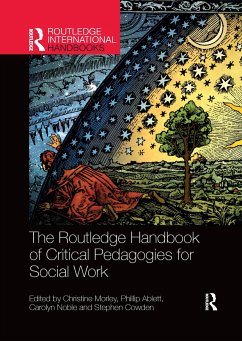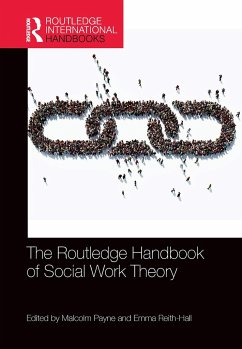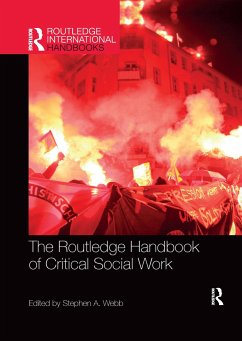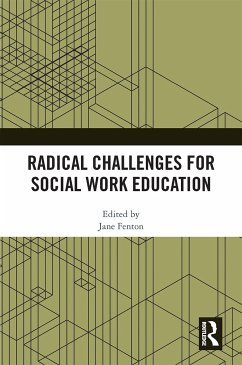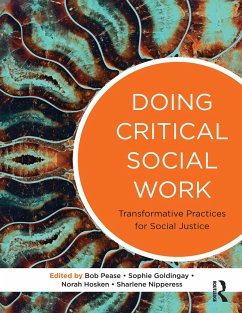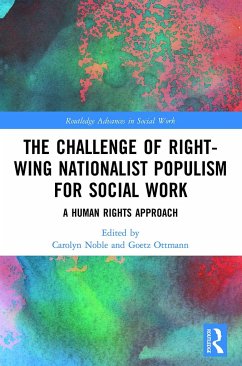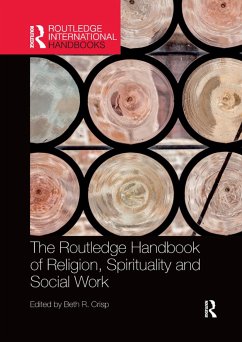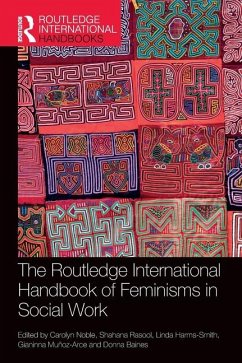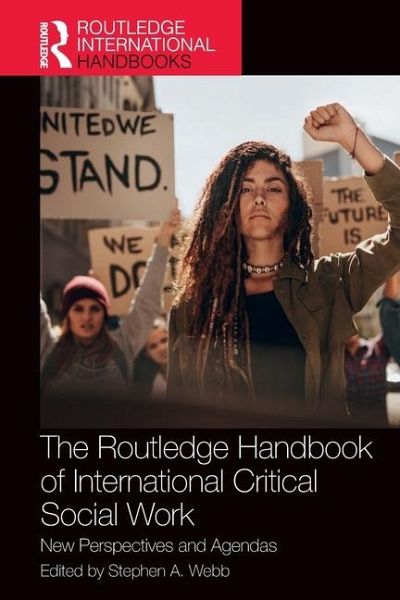
The Routledge Handbook of International Critical Social Work
New Perspectives and Agendas
Herausgegeben: A. Webb, Stephen
Versandkostenfrei!
Versandfertig in 6-10 Tagen
49,99 €
inkl. MwSt.

PAYBACK Punkte
25 °P sammeln!
The Routledge Handbook of International Critical Social Work is a companion volume to the Routledge Handbook of Critical Social Work. It brings together world-leading scholars in the field to provide additional, in-depth and provocative consideration of alternative and progressive ways of thinking about social work. Critical social work is increasingly involved in a global conversation, and as a subfield of social work it is rapidly becoming an interdisciplinary field in its own right and promoting novel forms of political activism. The Handbook showcases the global influences and path-breakin...
The Routledge Handbook of International Critical Social Work is a companion volume to the Routledge Handbook of Critical Social Work. It brings together world-leading scholars in the field to provide additional, in-depth and provocative consideration of alternative and progressive ways of thinking about social work.
Critical social work is increasingly involved in a global conversation, and as a subfield of social work it is rapidly becoming an interdisciplinary field in its own right and promoting novel forms of political activism. The Handbook showcases the global influences and path-breaking ideas of critical social work and examines the different stances taken on important political and ethical issues. It provides the first complete survey of the vibrant field of critical social work in a rich international context. This definitive volume is one of the most comprehensive source books on crucial social work that is available on the international stage and an essential guide for anyone interested in the politics of social work.
The Handbook is divided into sever sections
- Thinking the Political
- Politics and the Ruins of Neoliberalism
- Negotiating the State: Resistance, Protest and Dissent
- Race, Bordering Practices and Migrants
- Post Colonialism, Subaltern and the Global South
- Critical Feminism, Sexuality and Gender Politics
- Posthumanism, Pandemics and Environment
The Handbook is comprised of 46 newly written chapters (and one reprint) which concentrate on differences between European and American contributions in this field as well as explicitly identifying the significance of critical social work in the context of Latin America. It provides a further vital trajectory of intellectual practice theory via interdisciplinary discussion of areas such as biopolitics, critical race theory, boundaries of gender and sexuality, queer studies, new conceptions of community, issues of public engagement, racism and Roma people, ecological feminism, environmental humanities and critical animal studies.
The Handbook is an innovative and authoritative guide to theory and method as they relate to policy issues and practice and focus on the primary debates of today in social work from a critical perspective, and will be required reading for all students, academics and practitioners of social work and related professions.
Critical social work is increasingly involved in a global conversation, and as a subfield of social work it is rapidly becoming an interdisciplinary field in its own right and promoting novel forms of political activism. The Handbook showcases the global influences and path-breaking ideas of critical social work and examines the different stances taken on important political and ethical issues. It provides the first complete survey of the vibrant field of critical social work in a rich international context. This definitive volume is one of the most comprehensive source books on crucial social work that is available on the international stage and an essential guide for anyone interested in the politics of social work.
The Handbook is divided into sever sections
- Thinking the Political
- Politics and the Ruins of Neoliberalism
- Negotiating the State: Resistance, Protest and Dissent
- Race, Bordering Practices and Migrants
- Post Colonialism, Subaltern and the Global South
- Critical Feminism, Sexuality and Gender Politics
- Posthumanism, Pandemics and Environment
The Handbook is comprised of 46 newly written chapters (and one reprint) which concentrate on differences between European and American contributions in this field as well as explicitly identifying the significance of critical social work in the context of Latin America. It provides a further vital trajectory of intellectual practice theory via interdisciplinary discussion of areas such as biopolitics, critical race theory, boundaries of gender and sexuality, queer studies, new conceptions of community, issues of public engagement, racism and Roma people, ecological feminism, environmental humanities and critical animal studies.
The Handbook is an innovative and authoritative guide to theory and method as they relate to policy issues and practice and focus on the primary debates of today in social work from a critical perspective, and will be required reading for all students, academics and practitioners of social work and related professions.





